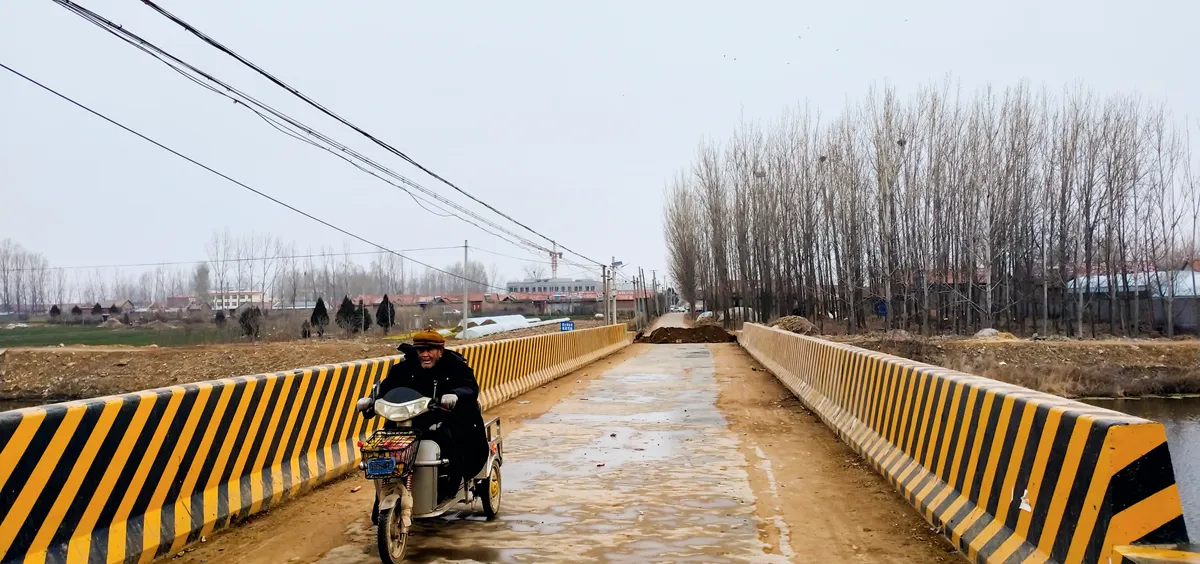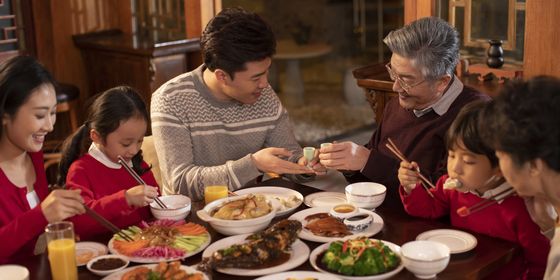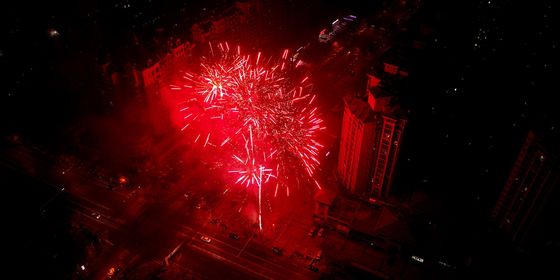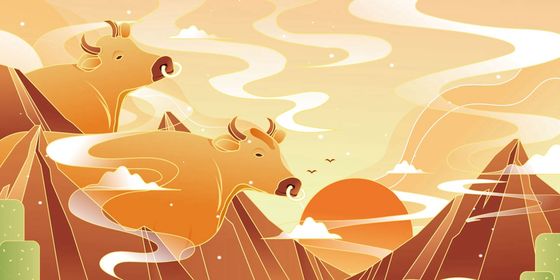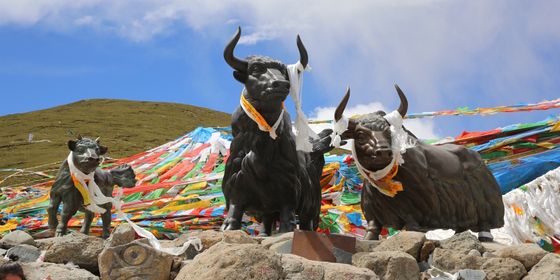Spring Festival in a village under lockdown
In January 2020, under the threat of Covid-19, a billion people celebrated an atypical Chinese New Year at home. In the latest issue of our magazine, “Contagion,” we translated an essay by writer Mai Cang, originally published by 人间 The Livings, on living under “lockdown” in his home village
My home village is called Taiping (“peace”). It is located at the junction of three counties and two cities in southeastern Shandong province. It is an ordinary village in northern China with a history of 500 years and a population of 2,000.
January 25 was the Lunar New Year’s Day of 2020, the third day of the lockdown in Wuhan, and the day before the lockdown of Taiping village.
My 95-year-old great-grandmother tells me she has survived locust plagues that covered entire mountains and fields, torrential rains that swelled into floods, and blizzards that shrouded the village in snow. Yet an epidemic that sweeps the whole nation is something she had rarely ever seen. Despite our distance from Wuhan, fear is in the air.
Day before the lockdown
Lunar New Year’s Day; cloudy
My mother wakes me at 2:30 a.m. According to the fortune teller she consulted before the Spring Festival, it was time for us to burn paper money and ingot for the dead and kowtow at the main crossroads of the village to pray for the safety of the family.
Drowsily, I throw on some clothes, take the “ghost money,” and hang the firecrackers on the stone wall at the gate.
With a cacophony of sounds, we usher in the new year.
Taking a flashlight, my mother and I walk to the street at the west of the village. Villagers often come here to burn ghost money, incense, and pray during festivals. However, this did not bring the village blessings in the past year. Early last spring, 53-year-old Tao drank bad sorghum wine (baijiu) and died in his newly built house; 23-year-old Gui drowned in the Huaihe River at the north of the village during Typhoon Lekima in August.
Brother Dong and Uncle Min, both in their 50s, were diagnosed with lung cancer. Dong died within six months, still believing he was only suffering from cerebral blood clots. Uncle Min stopped traveling around doing construction jobs, and picked up an old hobby—fishing.
He comes every day with his fishing rod and sits on the riverbank for a whole day. Though the surrounding residents say he seldom catches any fish, he still shows up every day like clockwork.
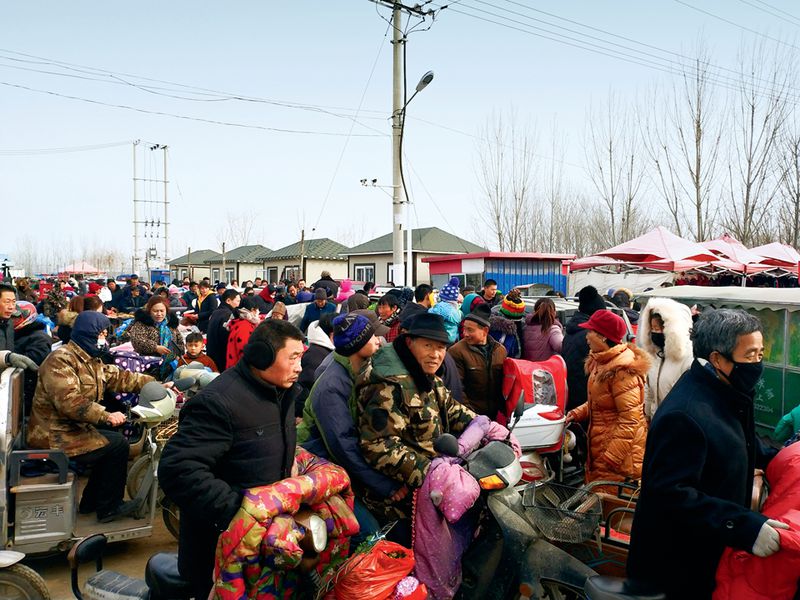
Taiping’s market is still teeming two days before the holiday
The dawn is breaking when we return. My father has already prepared to make New Year’s visits. In Taiping, from today to the fifth day of the lunar new year, males of the same clan must go together to call on the elders, while women go to burn incense at the Qingshi Hill and Temple of the Stone Grandma [Editor’s note: a protector of children according to folk beliefs in some areas].
As every year, all the men of my clan gather at my home, and are led by my father to visit my great-grandmother, the oldest person alive in the clan.
Great-grandma lives with the family of Third Grandpa. When we arrive, she is sitting on the sofa with her tiny bound feet, beaming in her padded jacket. We all kneel down and kowtow to her. She gets up and hands out candy. “I want red envelopes [of money] instead of candy!” I joke, and she smiles and caresses my head.
We gather around Great-grandma to chat. But instead of relating all the family gossip from the past year, the topic of conversation is the virus.
Our respected Third Grandpa tells us the situation doesn’t look good. “I heard Taiping village will also go into lockdown.” Indeed, the news was already spreading quickly, from the county government down to the village WeChat group.
The lockdown is just around the corner, but today, our anxiety is buried under the festive atmosphere.
For many years, neighbors and relatives would gather at my home on New Year’s Day. From 9 to 5 this year, over 40 people came over to chat. My task is to fuel the stove, heat the room, boil the hot water, and make tea for the guests.
Farming is time-consuming, so neighbors rarely have the time and leisure to socialize like this. One group comes after another.
When the night falls and street lamps turn on, the voice of our new village head, Old Zhang, blares from the loudspeaker. He announces that Taiping village will begin lockdown tomorrow to prevent the spread of the novel coronavirus. No villager is to visit relatives outside of the village.
My parents decide to cancel their plan of going to the temple fair. Fortunately, we can still travel within the village, and can kill time by visiting the neighbors.
After supper, I go with my parents to watch the fireworks by the Huaihe River. Like every year, the riverbank is crowded with villagers. The fireworks explode one after another, painting the sky above the village in a riot of colors. This is a centuries-old custom of Taiping and neighboring villages: Each clan receives the souls of their deceased kin back home in the morning to celebrate the new year, and sends them off with firecrackers at night.
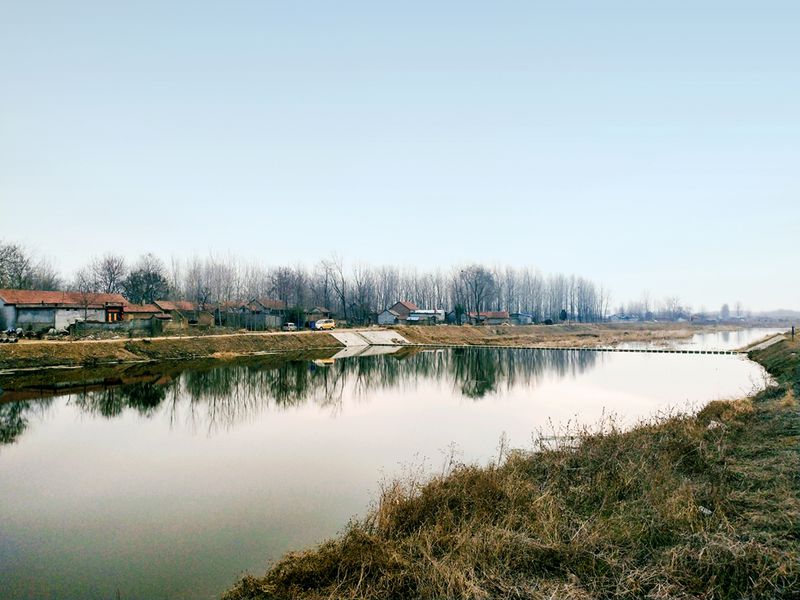
Taiping village lies on the bank of the Huaihe River
Perhaps this is the greatest spiritual comfort that village folk derive from the Spring Festival. On this day, the souls of deceased and their living descendants can coexist, and celebrate the new year together.
Also on this day, the National Health Commission announces 1,975 confirmed cases of coronavirus, including 324 severe cases, and 56 deaths.
Day 1 of the lockdown
Second day of the lunar new year; snowy
In the morning, Old Zhang’s voice blares over the loudspeakers again:
“Attention all villagers! As of today, the major roads out of the village are blocked. Don’t leave the village! Phone or text your New Year greetings!”
Indeed, green tents printed with the words “For Disaster Relief” had been put up in the middle of some roads, each guarded by three or four strong men in white masks who look like they are ready to confront enemies. Overnight, other roads were piled with rubble.
According to custom, the second and third days of the first lunar month are the busiest days for visiting relatives in Taiping. Most villagers would get up early and set off firecrackers to send themselves off on visits, for good luck. But this morning, the sounds of firecrackers are few and far between.
Snow flutters outside, and stove fires blaze indoors. So far, no suspected cases have been found in our county, so people remain calm. As they can’t leave the village, many choose to stay at home, drink, and talk.
Today is Third Uncle’s show, because his daughter and son-in-law have come home with their twin boys. Third Uncle and Third Aunt bustle around delightedly, cooking and heating the wine.
In his youth, Third Uncle was handsome, and was called “Little Wang Zhiwen” after the Chinese actor. He liked to wear flares and sunglasses, and roam around with a guitar. During summer evenings, Third Uncle often played guitar and sang in the threshing ground, which was also an outdoor “cinema” where villagers could watch films.
Third Uncle’s performance attracted many girls on these romantic movie nights. A girl with permed hair from a neighboring village, who was pretty but did not like working in the fields, finally won his heart. They got married at the end of the 1980s.
In the blink of an eye, more than 30 years passed. Both of Third Uncle’s daughters have started their own families and careers. In the presence of his daughter, son-in-law, and grandsons, he tosses down three cups of baijiu and starts to tell stories in high spirits.
He even discloses a shocking story of how a family in the village “borrowed sperm” secretly in order to have children and carry on the family line. My younger cousins and I are all stupefied at first, and then burst into laughter. He calmly drinks another cup and sighs, “How times have changed!”
It’s a cold night. But where there’s meat and alcohol, when people gather in the room to drink strong liquor and gossip, the fear and nervousness about the virus seem to dissolve in laughter.
Day 2 of the lockdown
Third day of the lunar new year; cloudy
The loudspeaker wakes me up early this morning. Old Zhang must have gotten up even earlier, sleepily thrown on his greasy fur coat, and stumbled over to the desks in his shabby office to begin his morning announcement.
I’m still lying in bed half asleep, but even I can hear the anger in Zhang’s voice:
“Attention all villagers! It is the second day of lockdown! Please support our work by staying in the village! You can watch TV to learn more about the situation in Wuhan! We must take preventive measures and kill the virus at the very beginning.”
“Also, villagers responsible for garbage collection, go look at the mess on the street! The Spring Festival does not exempt you from work! Hurry and clean it up! I’m gonna check on you at noon! One more thing, effective methods for preventing Covid-19 will be broadcast later. Please listen carefully!” A minute later, the preventative methods begin airing over the loudspeaker on the utility pole.
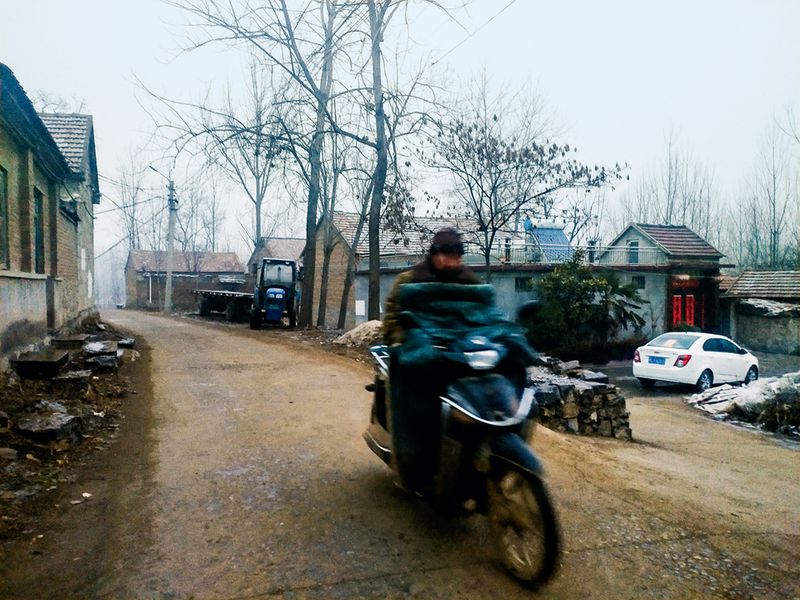
Village roads are almost deserted on the second day of lockdown
I walk alone on the empty street. The gate to every house is closed. It is quiet except some sporadic blasts from firecrackers, which are much weaker than yesterday. Around a quarter of an hour later, I finally see a figure coming slowly from the distance. When it comes nearer, I recognize it’s Grandpa Sheng.
Grandpa Sheng is heading back to work. He was widowed young, and now works for a duck farm in a neighboring village. I tell him the road to that village has been blocked, but it doesn’t deter him. “Fuck. I’m going to work even if I have to go by the side roads. I have 3,000 ducks to feed, or they’ll starve to death today. And if they starve to death, I’ll starve to death.”
The sight of his retreating figure makes me sad. Now in his 70s, Grandpa Sheng attends to 3,000 ducks and makes 20,000 RMB a year, plus the few duck eggs he pilfers every day. These days, his favorite activity is drinking baijiu and eating duck eggs. When he gets drunk, he would talk about his deceased wife.
Walking south, I spot some young men near the temporary “disaster-relief” tent all wearing masks. Like soldiers, they patrol there and stop outsiders from entering the village on Old Zhang’s orders.
Old Zhang is 50. He’s new to the village head job, and still energetic and ambitious. The lockdown is probably the first challenge of his career, and “victory is the only option,” he declares. Late last night, Zhang and two other Party committee members called on a young villager who returned from Wuhan in early January. Their manner angered the young man’s mother, and it was only with great difficulty that they persuaded him to quarantine at home.
***
After lunch, I visit Second Aunt with my parents.
Second Aunt is 87. Ever since she broke her hip three years ago, she has been bedridden. She looks hale and hearty on her sickbed, however—she probably never imagined that, having worked hard all her life, she’d be forced into retirement by a fall.
Even though she is confined to her bed, Second Aunt is concerned about the outside world. After asking about the coronavirus, she worries about her daughter-in-law working in Japan. It happened that her daughter-in-law had video-called just that day, and the first thing Second Aunt asked her was about the situation in Japan, and whether she should come home if there’s any risk. Her daughter-in-law was moved to tears.
Last year, Second Aunt’s oldest brother and his wife passed away, at the ages of 95 and 96, which are considered “auspicious deaths” at an old age. She hopes to live just as long, yet she’s troubled by the fact that she has to live on her son’s charity, and depend on him to feed her and take care of her personal hygiene.
In a village with primitive health care and senior care, how to live with dignity in one’s old age is a question inevitably faced by all.
Day 3 of the lockdown
Fourth day of the lunar new year; cloudy
At 7 a.m., the village loudspeaker starts another round of broadcast on disease prevention methods.
At 8:40, Old Zhang begins his message over the scratchy microphone, and sounds even more serious:
“Attention all villagers! All those who returned from Guangdong, Hunan, Sichuan, Chongqing, Anhui, Henan, and Beijing must register at the village checkpoint with your ID card as soon as possible! Also, the roads leading to Xiying village and Tangying village will be blocked today! Those who intended to go out for visits must give up those plans! Those who want to visit other villages or go to the county supermarket must bring an ID card!”
Old Zhang must be too nervous to notice that he contradicted himself. How could anyone go to other villages or the supermarket if the roads have been blocked? My cousin who works at the county supermarket told me on WeChat that they have hardly seen any customers, except at the disinfectant counter.
Zhang continues, “One more thing, if your chickens are roaming free outside, lose no time to pen them. If your dog is fastened outdoors, get it inside immediately! It’ll be embarrassing for you if you wait for us to catch them!”
I can understand Zhang’s anxiety. On this day, January 28, there are 5,974 confirmed cases of coronavirus in the country, an increase of 1,459 from yesterday.
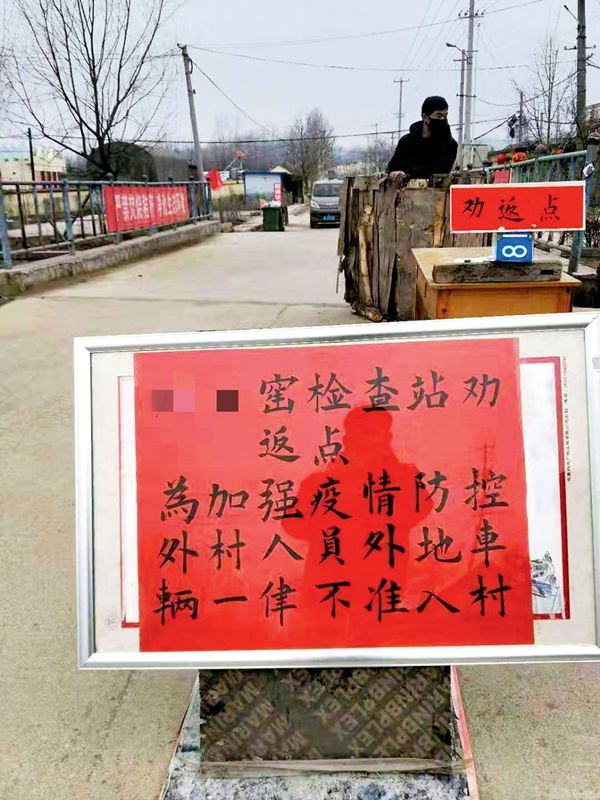
A notice at the village checkpoint prohibits nonresidents from entering
After breakfast, Cousin Jiang and his wife come over. My 56-year-old cousin has been excited about the lockdown, telling everyone that drinking alcohol can help kill germs. It gives him a good reason to drink.
Cousin Jiang worked in the village quarry and earned 50,000 RMB last year. But he has not decided where to work this year. He explains that his physical strength is no longer what it was, but he doesn’t want to stay in the village and farm. Currently, the majority of the 1,800 mu (120 hectares) of land in Taiping village is cultivated by people over the age of 60. Young people seldom stay in the village. They either get jobs in big cities or do business in town.
Work is not the only thing on Cousin Jiang’s mind. He is infuriated that the six roosters and three geese they’d been raising near the gate of their house had been stolen on a cold night before the lunar new year. As punishment, he did not feed their black dog for a whole day; the dog lived in the same yard as the chickens and geese, so why didn’t it bark, or bite the thief?
Actually, according to Cousin Jiang’s wife, the dog did bark, but Cousin Jiang was drunk and sleeping too soundly to hear, and she didn’t think it was anything important. They didn’t discover the theft until they saw the empty coop and the lonely dog the next morning. When Cousin Jiang checked his neighbor’s surveillance video, he was shocked to find that the thief was someone he recognized.
Cousin Jiang takes another drink and sighs about the fickleness of the world. Taiping is no longer the village we knew. There was no longer trust or goodwill between neighbors.
He has a point. Burglaries have become common in the village. Just before the lunar new year, 83-year-old Aunt Xia came home from the market and saw a man in his 30s walking out of her house. The man was surprised to see her for a moment, then bowed and apologized, “Sorry, Auntie! Excuse me!”
By the time Aunt Xia recovered from the shock, the man was long gone, and it dawned on her that he was a thief.
Fortunately, there is nothing valuable in her house. The thief only took three coins that were lying on the table. Still, the story has become the laughingstock of the village.
In the afternoon, news spreads all over the village that the daughter of the Xia family, a nurse at the county hospital, has departed for Wuhan to provide medical relief. Everyone praised this brave girl.
Meanwhile, it’s announced that the five large rural markets in the area, including the Taiping Market, will be closed temporarily. No one can buy anything, and the families who run small businesses there will not be able to reopen their stalls—including the Old Jing’s family, who sell deep-fried dough sticks and dough twists; Sister-in-law Chun’s family, who sell tofu jelly; Uncle Hua’s family, who sell skewers; and the Ye brothers, who sell pork. It was supposed to be their busiest time of the year.
But what can they do but accept it?
Day 4 of the lockdown
Fifth day of the lunar new year; snowy
It’s snowing, and windy. Old Zhang’s voice doesn’t come on the loudspeaker until 9:40 a.m. He re-emphasizes what he said in the last few days, and then adds, “No Taiping villagers shall visit each other, either. So far, no cases have been found in our county. Our village cannot be the weakest link! We cannot relax!”
The older villagers seldom leave the village anyway. But now, other people cannot get in. Since early this morning, 80-year-old Grandma Jiang has been standing at her gate and looking out. Her son and daughter, who have both settled in town, were supposed to visit her today, but they could not make it because the village and town are both locked down.
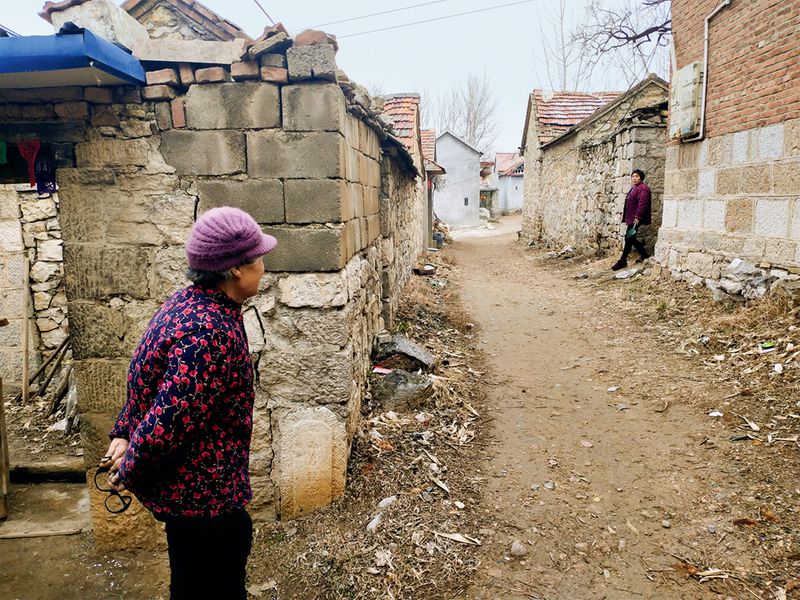
Grandma Jiang waiting for her children at the gate
In previous years, this was also the day when farmers in the village resumed work after the Spring Festival, but that’s impossible this year. Nevertheless, 48-year-old Brother Feng and 49-year-old Cousin Yong arrive at their fields nearly at the same time on this cold morning.
Brother Feng is wearing a mask. He walks down the road leading to town, and returns after confirming that it’s blocked.
Cousin Yong comes by bike to check on his vegetable patch. These 3 mu (0.2 hectares) of land were the only property his father left to him. Looking at the shabby hut his father left on the land, he is overwhelmed by emotions.
Yong’s daughter, a college junior, needs 20,000 RMB in tuition and expenses. It’s the family’s biggest expense of the year. To make more money, Cousin Yong rented another 10 mu (0.67 hectares) of land at 200 RMB per mu this year to grow vegetables and Sichuan pepper. He has also had a 50-meter deep well dug on the field for irrigation.
Cousin Yong says that he does not want to work in the city any more, but these days, to support a family by farming the land is not easy.
Brother Feng suggests jokingly that Cousin Yong should grow more cabbage, or whichever crops rise the fastest in price during the pandemic.
Cousin Yong retorts that he needs long-term planning, not short-term gains.
Life under lockdown in the village is fairly ordinary and unimpressive. Many years ago, the Spring Festival holiday in the countryside lasted from the first day to the 15th day of the first lunar month, and there were celebrations every day. But now, people are as busy in the countryside as in the city, and start working or making plans for the coming year as early as the sixth day.
The lockdown seems to have halted the fast pace of life all of a sudden. Whether in the city or the countryside, the holiday shows no sign of ending.
Day 5 of the lockdown
Sixth day of the lunar new year; cloudy
The sixth day in the new year, which falls on January 30 this year, is traditionally the day for reopening the Wangzhuang Market after the holidays.
At 8:00 a.m., 45-year-old Brother Dong sets off firecrackers to celebrate the reopening. All year long, he and his wife drive a truck carrying flour and a wok to the market to sell deep-fried dough sticks and dough twists. This will be his first trip after the new year.
Though it was already announced that the local markets were closed, Brother Dong is still hopeful, believing that people from neighboring villages will want to go to the market on their own.
When he arrives at the market on his motorbike with me in tow, Brother Dong finally realizes that he is wrong—there is no one there.
He complains all the way back to the village. Last year, his 20-year-old son fell in love with a woman six years his senior from another village. She gave birth to their son last month. Dong’s son was not prepared, and neither were his parents.
Dong’s wife hired a yuesao (“maternity matron”) from town to take good care of their daughter-in-law and newborn grandson at 7,000 RMB per month, becoming probably the first family in the village to do so.
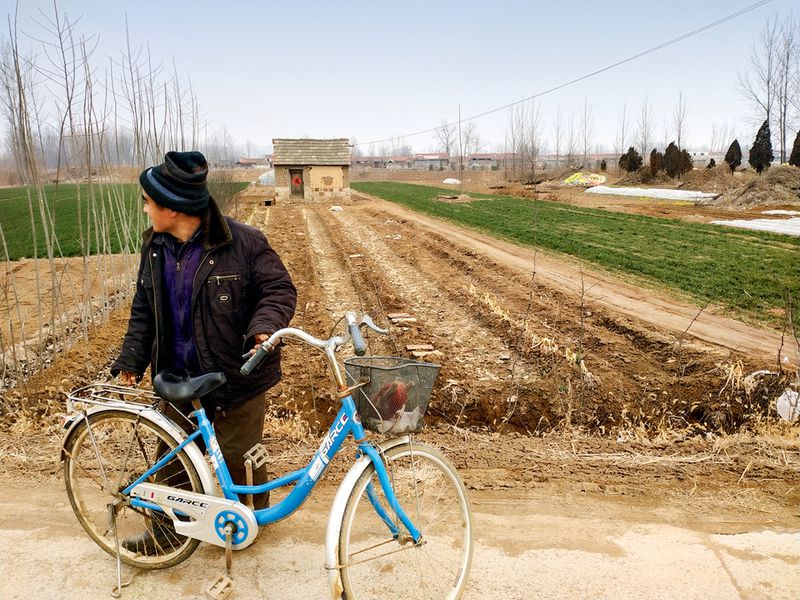
Cousin Yong coming to check on his fields
On the first day, the yuesao presented Dong’s wife with a diet list for her daughter-in-law.
“It is enough for new mothers to eat two eggs per day, and not eat much else,” the list read. This distressed Dong’s wife: Back in her day, she ate 16 eggs for a single meal after she gave birth!
It’s a scientific diet, the yuesao explained.
Dong continues complaining. Purchasing an apartment in town for his son’s marriage cost over half of his savings. Next, he needs to buy the young couple a car. But how can the young couple support themselves and their child without any income?
On the other hand, young rural men cannot find a partner if they do not own an apartment and a car.
“If the market remains closed, I’ll earn 20,000 RMB less, in less than one month,” Brother Dong, who has to support them all, laments.
***
In the afternoon, my grandmother says she wants to visit her older sister in Donggou village, three kilometers away. They have not seen each other for four years.
I tell her all the villages have been locked down; cars can’t leave, nor tractors. But Grandma asks me to take her on the electric tricycle. She already asked around and heard that electric vehicles can get around earthen barricades on the roads.
Thus, I set off with my 84-year-old grandmother, a basket of eggs, and two cartons of milk to Donggou village. Soon, we can see the mounds of dirt, a checkpoint, and the village in the distance. After passing the roadblocks, we’re stopped by three middle-aged men in masks and asked for our ID cards.
Grandma starts to get angry. Why would she need ID to visit her own family? The men become very courteous and ask who we were going to see. “Whose children are you?” Grandma asks instead. Eventually, they figure out that they ought to be calling my grandmother “Second Aunt.”
The men offer to personally escort Grandma into the village. Suddenly, I feel that we’re on Grandma’s “turf.”
All the elderly people sunning themselves by the road come up and greet my grandmother as we pass. Grandma asks me to slow down. She is overjoyed to see her old neighbors and wants to stop every now and then to exchange a few words with them. It takes us half an hour to ride the short distance through the village.
It’s nearly noon when we arrive at my great-aunt’s home. In the yard, Grandma sits and chats with her 87-year-old sister under the sun. I sit alone at the gate in order not to disturb them, and recall the times when I came here with Grandma to visit her family in my childhood.
Surrounded by news of turmoil from all over the nation, it’s a kind of happiness to be able to sit here quietly and think of the old days.
Day 6 of the lockdown
Seventh day of the lunar new year; cloudy
The seventh day of the first lunar month is the traditional day for “sending off the year”—to bid farewell to the holidays and resume normal life.
This morning, my parents are up early. My mother lights a stick of incense in the censer, while my father sets off firecrackers with a bamboo stick. Thus, the Spring Festival ends in another cacophony of sounds.
Today, more villagers have come out on the streets to enjoy the sun. Some also go to check on their crops.
Uncle Min rides his electric bike to the riverbank with his fishing rod, sits on his folding stool, and starts fishing again. Uncle Sen, an old bachelor, joins him. Uncle Sen seems to be well-prepared. He first sprinkles millet soaked in baijiu, sesame oil, and honey into the river, and then throws in a fishhook baited with an earthworm and quietly waits for the fish to bite.
Despite all of this effort, two hours later, Uncle Sen has failed to catch any fish, while Uncle Min has hooked four fat carp one after the other.
Uncle Sen is now 57, and it’s clear that he won’t start his own family. He says he only wishes to live healthily and peacefully for the rest of his life.
There are over 40 so-called “bare branches” like him in Taiping village. Old bachelors who are over 70, or are of poor health, are sent to the senior home in town.
Before the Spring Festival, I heard that these old men demanded to go back to the village for the holiday. Hunchbacked Cousin Li went to his younger brother’s home; honest Uncle Zhong to his nephew’s; while Uncle Guo, a free spirit all his life, celebrated New Year’s Eve alone in his own shabby home. Uncles Sheng and Kai also wanted to go home, but their health did not permit it. According to Cousin Li, when the rest of them set off for the village, Uncle Sheng lay in his bed and cried out of homesickness.
Today is the day they go back to the senior home. After breakfast, Uncle Zhong sheds tears at the table, explaining that he wants to stay in the village. Free-spirited Uncle Guo is the only one that appears to be in good spirits, announcing to the whole street that he is leaving. But who knows how he truly feels?
Uncle Sen, who hasn’t caught a fish all morning, says he’ll never go to the senior home. “I’ll save up and have my nephews take care of me.”
At 6 p.m., the loudspeaker finally falls silent. Everyone hopes the roads can reopen soon; after all, we all have to continue living.
– Translated by Tan Yunfei (谭云飞)
Text has been edited for length. Names and locations have been changed for privacy reasons.
Close to Home is a story from our issue, “Contagion.” To read the entire issue, become a subscriber and receive the full magazine.





